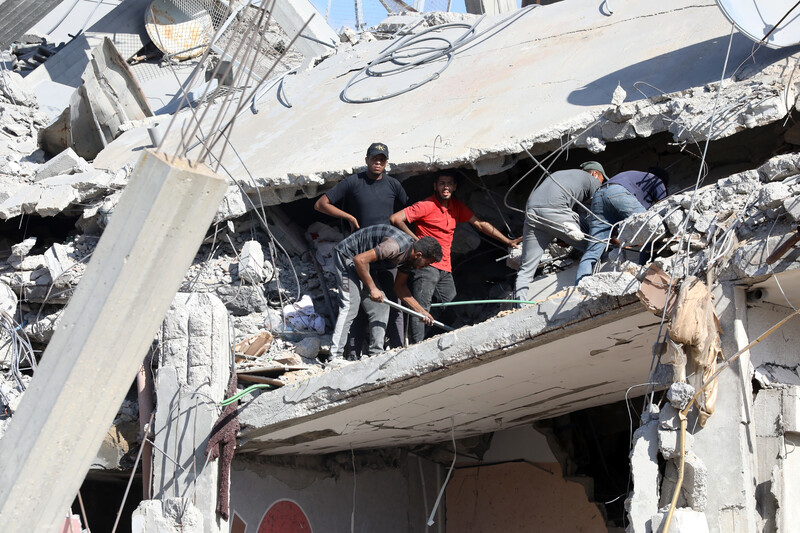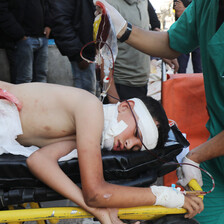The Electronic Intifada 1 October 2024

Men conduct a search for survivors after an Israeli air strike in Bureij on 18 September.
The Electronic IntifadaSamir, my sister Maryam’s husband, is a professor at Al-Aqsa University.
He and his family, including 3-year-old twin sons Omar and Muhammad, had been living in the Tel al-Sultan area of Rafah.
When Israeli tanks rolled into Rafah in May, Samir feared losing his children and thought about fleeing with his family. But tents for displaced people were full everywhere, and all his relatives and friends were displaced.
After a lot of thought, he decided to go with his brothers and their families to the Miraj area on the northern boundary of Rafah and Khan Younis. There was a gas station there, with some fuel, that would be vital if they decided to move by car.
Samir and his family took their belongings and went to the station. A day after doing so, Omar, Samir’s father, found a four-story house whose owners had fled due to the lack of water and other services.
Omar rented the house, which was about 50 meters from the gas station, and when he told his children and grandchildren, everyone was very happy.
Two months after they settled in the place, Israel bombed the gas station.
To Samir, who had been away from the house, it felt like an earthquake. Windows shattered and black smoke filled the skies. People came out of their apartments panting and screaming, searching for a brother or father or sister. Mothers grabbed their young children and tried to get away from the falling rubble.
Samir eventually arrived home to look for Maryam and the children but did not find anyone at first. When he saw them, they were all running in the street, his wife crying and carrying the screaming twins.
Samir hugged them and carried Omar in his arms. They made it to a road and climbed into a horse-drawn cart. Samir asked the driver to take them to Nasser hospital because Omar seemed to be having trouble breathing.
A message from under the rubble
Nasser hospital is adjacent to where I and other relatives were living. We had been watching the thick black smoke from the window, which I was told was the result of the bombing of the gas station in the Miraj area.
Everyone in my house was trying to contact my sister, her husband or any other member of the family possibly still there.
Eventually, my father got hold of someone on the phone of Samir’s father, Omar, who told us that my sister, her husband and her children were fine.
About a minute later, they were at our front door.
Maryam was crying and panting. I ran to our mother and we both hugged her while she was crying. My mother started laughing over the fact that my sister was wearing her husband’s coat.
Samir, who had gone to the hospital with Omar, kept trying to contact other family members, but he was unable to check on everyone.
Then, at around 10 that night, after Omar had settled down and was feeling better, a message arrived on Samir’s mobile phone. It was from his nephew, Hani: “Help me uncle, I am dying under the rubble of the station’s outdoor bathroom.”
Samir ran to the hospital again. He persuaded an ambulance driver to take him back to the gas station, where they found Hani, 29, unconscious under the rubble.
He survived. The paramedics got him back to hospital where he was treated. But he was badly injured and he is still recovering from his various fractures and the wounds to his face.
In Gaza, stress and pain is never far during this genocide. A few weeks after the bombing of the gas station, we got news that Ahmed and Muhammad, the sons of my professor at university, Hussein al-Salibi, had been killed.
We learned of this desperate news when we came across of a video of a man stricken completely with grief.
It took me a while to realize that this was my professor at Al-Aqsa University, a man of dignity, faith and strength. A man with whom Samir was colleagues.
We all shared his grief. Samir especially, who cried for his friend’s pain.
But none could share the pain of a man losing two young sons.
Dina Hussam al-Banna is a writer in Gaza.



